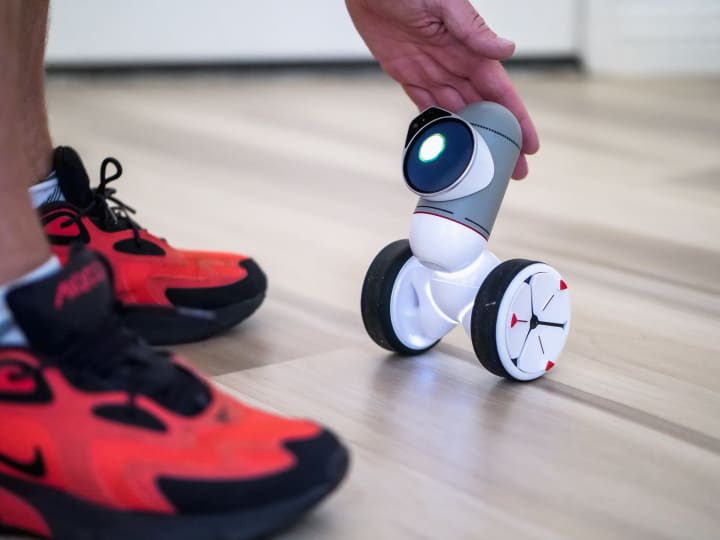How Artificial Intelligence (AI) is reshaping the world ?
Let's talk about how AI is changing the world.

AI is transforming our environment, with far-reaching implications for how we work, live, cooperate, make decisions, and participate as a society. But what are the dangers, and how can we prepare for them?
Artificial Intelligence (AI) is a term that refers to a One of our time's most prominent technical terms—and one that is sometimes overused or even misunderstood.

Artificial Intelligence-driven success stories and "dystopias" are popular in the media. Human workers being replaced by machines, AI surpassing human intelligence, robots gaining command, and so forth.
If you look past the hype, you'll notice that a true revolution is underway. Examine recent breakthroughs in subjects like Deep Learning and their applications in domains like Computer Vision and Natural Language Processing to get a sense of AI's potential.
How Artificial Intelligence (AI) is reshaping the world. ?
A mix of technologies is enabling machines to make sense of enormous amounts of data and execute cognitive activities, causing a massive disruption in development.
AI is transforming our environment, with far-reaching implications for how we work, live, cooperate, make decisions, and participate as a society.
1. Artificial Intelligence (AI) is a term that has been defined.
Artificial intelligence (AI) is a technology that allows systems to encompass cognitive processes as well as adaptive and learning capabilities, resulting in self-improvement.
AI-powered systems can capture and ‘understand' their surroundings, allowing them to make the best decisions in real time to achieve specified goals.

Computer Vision, as a form of AI, allows systems to ‘see' using complex algorithms. These are trained to recognize a wide range of entities in a photograph or video, including landscapes, people, and objects.
'Natural Language Processing' technologies enable interaction with a machine based on free-form, natural speech, which is another example of applied AI.
Natural language processing (NLP) and associated technologies can ‘understand' natural speech and respond appropriately. When the computer understands the context of the "natural speech" request, it synthesizes the appropriate response, which is then returned to the user as "natural speech."
Streams of data on significant human activities have aided AI's rapid advancement. These include, but are not limited to, online communication, social interaction, device usage, searches, content consumption, and IoT data streams.
AI systems use cloud computing and specialized machine learning algorithms to make sense of these massive volumes of complex data. World-scale data centers with massive, labelled data sets are being utilized to train AI algorithms to perform certain cognitive tasks.
2. The current situation of affairs
The ability of a computer to "see" is a remarkable accomplishment. AI-powered systems can comprehend the context of an image or video to a remarkable degree. They can successfully detect a growing number of entities, including people, identified individuals, automobiles, houses, streets, trees, and more.
Algorithms can estimate other features from an image or video, such as the number of people in the shot, their gender, age, or even their emotional condition.
You may just upload a family photo to one of the commercially available cognitive services and receive a response in milliseconds that includes the names of the people in the shot, their gender, age, and the dominating emotions. It is also possible to identify an object in a photograph. For instance, AI can recognize a car, as well as its manufacturer and model. It can then categories and classify it for easier searching, grouping, and discovery.
Algorithms will soon be able to infer even the implicit setting, such as a children's party, a sporting event, a business meeting, or a random group of individuals in a park.
Computer vision has a wide range of potential uses. From self-driving cars that can ‘see' in 360 degrees and understand their surroundings and dynamics in real time, to unique applications like Microsoft's Seeing AI – a prototype system that helps visually impaired or blind people understand their surroundings!
Computer vision is progressing rapidly, with significant applications in autonomous vehicles, navigation, robotics, pattern recognition, medical diagnosis, and other fields. AI systems are constantly learning, and they learn quickly.
A little contact with Amazon Alexa, Cortana, Siri, or Google Assistant is all it takes to see how far Natural Language Processing technology has progressed.
Microsoft and IBM announced that their natural language processing (NLP) capabilities perform on par with (or better than) expert transcribers in processing conversations ranging from sports to politics.
Duplex, Google's digital assistant technology, was recently showcased, and it is capable of doing some tasks through a natural conversational experience. It can, for example, set up a meeting or appointment with a human using a free-form discussion.
Digital assistants will grow more intelligent, contextualized, and proactive as time goes on.
Your digital assistant will answer organically, in a conversational tone, and possibly with a style, attitude, and humor that matches your personality and present mood at some time in the not-too-distant future.
Every encounter with the user teaches digital assistants something new. They are more closely aligned with the user's verbal or implicit preferences. By seamlessly leveraging comprehensive knowledge about the user, signals from the user's environment, and global trends and dynamics, DAs will become proactive and autonomous at some point in the future.
3. Artificial Intelligence's Impact on Industries
AI is already having a significant impact on our socioeconomic structure. Markets, businesses, education, government, social welfare systems, organizations, employment models, and societal structures have all seen significant changes. As a result of clever technology and automation, everything will be reshaped in the near future.
As outlined below, the widespread deployment of AI will radically alter all industries.
System of transportation
This industry is undergoing a significant transition. Autonomous vehicles will be available in the near future. They'll be more secure, efficient, and effective. Autonomous trucks, smart containers, driverless taxis, and smart cities are just a few examples of what the transportation sector will look like in the future.

AI in transportation will have a huge impact not only on the cars themselves, but also on the entire ecosystem – from taxi services to e-commerce and package delivery.
With the move from owning a car to using on-demand transportation services, consumer habits will be significantly impacted.
The cost of a vehicle as a service will be much lower due to, among other things, the ability of the firm providing the service to make greater use of the cars.
AI algorithms will manage entire transportation networks made up of fleets of autonomous automobiles to best respond to demand, traffic, and other situations in real time. This will change how individuals commute, as well as how cities expand and grow.
For example, the new era of cheaper, faster, and safer transportation with autonomous vehicles could spark a de-urbanization trend – especially when time spent in autonomous vehicles can be fully productive with the capabilities of a contemporary workplace.
Commerce via the internet
With enhanced AI-powered personalization, dynamic pricing, and offer generation, the customer experience is becoming smarter.
Fulfillment centers are becoming more automated, with robots exploring the room to collect products and fulfil consumer orders autonomously in some circumstances.

Drones and cars without drivers could play a role in the last stages of delivery. Because centralized intelligence will manage all operations, traditional sales procedures, channels, and physical store networks will become less significant, causing the sector to be disrupted.
Insurance and financial services
AI will aid any industry that requires a large quantity of data processing and content handling.
Significant transaction validation, fraud detection, stock trading, recommendation, and advisory services operations will be automated by financial institutions.

To improve risk estimations, insurance companies will use the large volumes of data accessible as well as predictive and machine learning technology. As a result, businesses will be able to provide superior products that are tailored to the specific needs of a specific customer.
The adoption of smart, driverless automobiles will also have a huge impact on car insurance firms.
The Government and Citizenship Services
Artificial intelligence (AI) has the potential to reduce bureaucracy, improve citizen services, government, and social programmers.
Legal assistance
AI will re-define even more traditional occupations that are built on strong relationships, such as legal professions. In the legal arena, typical support services include document handling, classification, discovery, summarization, comparison, and knowledge management – all of which are tasks where AI agents currently excel.
Product development AI adds new capabilities to the traditional product development process, whether it's for digital or physical goods. The AI-powered potential for innovation are growing exponentially as advanced cognitive technologies (cloud-based commercial AI services via easy-to-consume APIs) and low-cost integration scenarios become more widely available.
The cloud and commercial cognitive APIs make it simple for software developers to create cognitive apps that are driven by advanced AI capabilities. AI-powered production lines, quality control systems, and continuous improvement methods can all help physical product manufacturing processes. Products will be constructed in whole new ways in the near future, and they will be connected and intelligent.
On top of world-class education, AI will drastically improve the overall education system.
Intelligent education agents will capture a student's demands in order to create ideal individualized educational programmers that fit the student's goal, the appropriate level, pace, preferred sorts of content, and other factors.
In another scenario, AI-powered apps will be able to recommend proactively educational opportunities and personalized educational content based on a user's current career, education level, and prior experiences.
This may take the shape of an intelligent, always-on "education adviser" who finds the best learning possibilities for each user.
4. Concerns
The social, political, and ethical ramifications of AI's widespread adoption raise severe concerns and unanswered challenges.
For example, ‘intelligent automation,' which can be scaled up using Artificial Intelligence, is projected to change the way we work and the skills that are in demand. Certain roles will become outdated, and certain vocations will be phased out.
Autonomous Weapons with Lethal Effects
The idea of a self-driving machine is fascinating. Consider an autonomous vehicle that can sense its surroundings and dynamics and make real-time decisions to achieve a stated goal — moving from point A to point B — while adhering to specific limits.
However, in a military setting, this decision-making autonomy is terrifying: so-called Lethal Autonomous Weapons are futuristic robotic weapons that could hit targets without human intervention or approval.
But who is in charge of designing, operating, and assigning targets to such "killer robots"? How would a robot like this be able to comprehend the subtleties of a complex scenario and make life-or-death decisions? And there are plenty more.
The necessity for transparency and the risk of prejudice
AI systems learn by processing large amounts of data, and they change over time by modelling interaction data and receiving user feedback.
How can we assure that the AI algorithms' initial training is unbiased? What if a corporation purposefully or unintentionally biases the training data set in favor of certain customer or user groups?
What if, for example, the algorithm in charge of picking talented individuals from a pool of CVs has inherited known or undisclosed biases, resulting in concerns such as diversity?
We must ensure that the decision-making procedures of such systems are transparent. This is critical for better management of edge cases while also promoting a wider audience's and society's comprehension and acceptance.
Data, information, and technology are all accessible.
A relatively small number of corporations collect massive volumes of data in our linked society. Access to this information would enable a precise recreation of our daily activities, interactions, and explicitly expressed or implicitly identified interests. Anyone having access to this information would be able to see our travel history, online search and social media activity, chats, emails, and other online micro-behaviors and interactions.
An AI system will be able to ‘understand' each internet user in terms of interests, daily habits, and future demands, and it will be able to make astonishing calculations and forecasts, ranging from purchasing preferences to the emotional condition of the user.
If you think about this AI output in terms of scale — examining data at the population level — these forecasts and insights might explain the synthesis, state, and dynamics of a whole population.
Those in charge of such systems would obviously have enormous control over this vast amount of data. Consider the Cambridge Analytica scandal. The data for a single user may be of little value, but when studied at scale — for a large enough group of users, using advanced analytical and inference methods — it has the potential to have huge socio-political impact.
Privacy is a fundamental right.
When the danger of unwanted access to one's online history (or other data) is considered, the right to privacy is clearly jeopardized. However, even in the instance of an offline user — someone who has purposefully chosen to remain ‘disconnected' — the right to privacy remains in jeopardy.
Imagine going around the future's "smart city" as a disconnected user (no smartphones or other devices aware of the user's whereabouts). A walk down a couple of main streets would be enough for the network of security cameras to gather user traces and maybe identify them using reliable facial recognition against a centralized data repository using a network of security cameras. There are obvious, major concerns about who has access to this data and under what circumstances.
Control and access by unauthorized individuals
The importance of security and access control cannot be overstated. When a smart system (such as an autonomous automobile) is compromised, the results can be disastrous. The protection of linked, intelligent systems and machines from unwanted access is a major responsibility.
Unemployment due to technological advancements
This is described as unemployment that is ‘explained' by the use of new technology – in the AI era, this refers to jobs that have been replaced by intelligent automation.
We will see big changes in the workforce and markets in the next years. Roles and jobs will be rendered obsolete, industries will undergo drastic transformations, and employment patterns and relationships will be re-imagined.
Customer service/call centers, document management, and content moderation, for example, are increasingly reliant on technology and intelligent systems.
The same may be said for jobs involving the operation and maintenance of production lines and factories. Smart robots are displacing humans by navigating the space safely, finding and moving objects (such as products, parts, or equipment), and performing complex assembling processes.
However, AI has proven to be quite effective at handling even more difficult tasks, such as those that necessitate real-time processing of various signals, data streams, and accumulated knowledge. Autonomous vehicles, for example, can collect and "understand" their environment and its dynamics – they can "see," "decide," and "act" in real time. Professional drivers (taxi, trucks, and others) will face a significant decline in demand for their skills.
Difficult judgments, ethics, and societal responsibility
In real-time mode, AI allows for optimal decisions. Although the best decision is usually objectively decided and widely accepted, there are a few circumstances that raise ethical and moral concerns.
For example, an autonomous vehicle that detects that it is about to collide with a pedestrian must determine whether to attempt to avoid the vulnerable pedestrian by engaging in a potentially dangerous (to its passengers) maneuver. And the decision must be made in milliseconds.
The logic that behind these pivotal judgments must be well-defined, understood, and accepted. At the same time, under specific data protection standards, the autonomous car's detailed history of activity and judgments must be accessible and available for examination.
Power and control over data are unequally distributed.
Artificial intelligence is being heavily invested in by technology businesses, both at the scientific/engineering level and at the commercial and product development level.
When compared to any ambitious opponent, these businesses have an unrivalled advantage. Massive datasets in a variety of formats describing a wide spectrum of human activity (searches, communication, content production, social engagement, and more) (text, images, audio, video).
In order to maintain their dominant market positions, tech companies frequently purchase promising tech/AI startups that are challenging the market. With a unique combination of AI technologies applied to enormous volumes of acquired user and machine data, this might lead to super-powers.
5. The assurance
Hundreds of billions of linked devices provide events, operations, and other data to advanced Big Data, Machine Learning, and Artificial Intelligence technologies as part of the Internet of Things (IoT).

This plethora of data, along with the growing ability to make sense of vast, complicated data sets, is allowing for enormous improvements in health, lifestyle, transportation, education, and virtually every human activity. This technological revolution, if certain assumptions are correct, will usher in a new period of prosperity, creativity, and well-being.
Yes, technological unemployment is a real possibility.
However, Artificial Intelligence will most often serve as a complement to humans, allowing them to perform better in complicated and important situations that require judgement and creative thinking.
Humans will no longer be required to perform routine, low-value professions in the future. The workforce and underlying employment structures will shift away from long-term, full-time contracts and toward flexible, selected service provision.
A slew of new business prospects will emerge, bolstering the culture of entrepreneurship, creativity, and innovation.
Simultaneously, a slew of new roles and specializations will emerge, focusing on technology and science, allowing people to shift their focus away from low-value, boring employment and into more creative pursuits.
Personalized curricula and a life-long learning mode will become the norm in educational systems. Intelligent access to the world's accumulated knowledge, ideas, and creative energy will enable innovation and innovative thinking.
We will see a dramatic reduction in accidents and fatalities on the roads as AI is applied to the transportation business. People will also benefit from cheaper transportation costs and improved service levels.
Final Words
With intelligent discovery tools, people will have improved access to the world's digitized knowledge. Intelligent components and AI-powered services will improve the problem of fake news, as well as content quality, security, and online safety.
Artificial Intelligence is also helping to improve our health care system.
About the Creator
Blogs Year
Blogs Year is an internationalist literary magazine based in the India, United states. Publishing a variety of contemporary writers from around the world, it provides Latest, Viral , Trending News of the Worldwide.






Comments
There are no comments for this story
Be the first to respond and start the conversation.